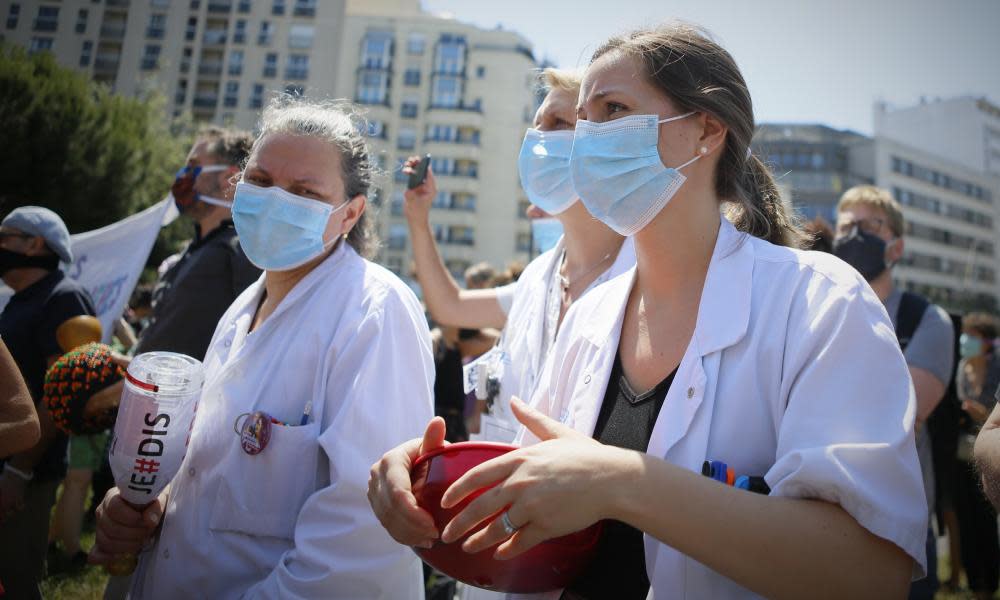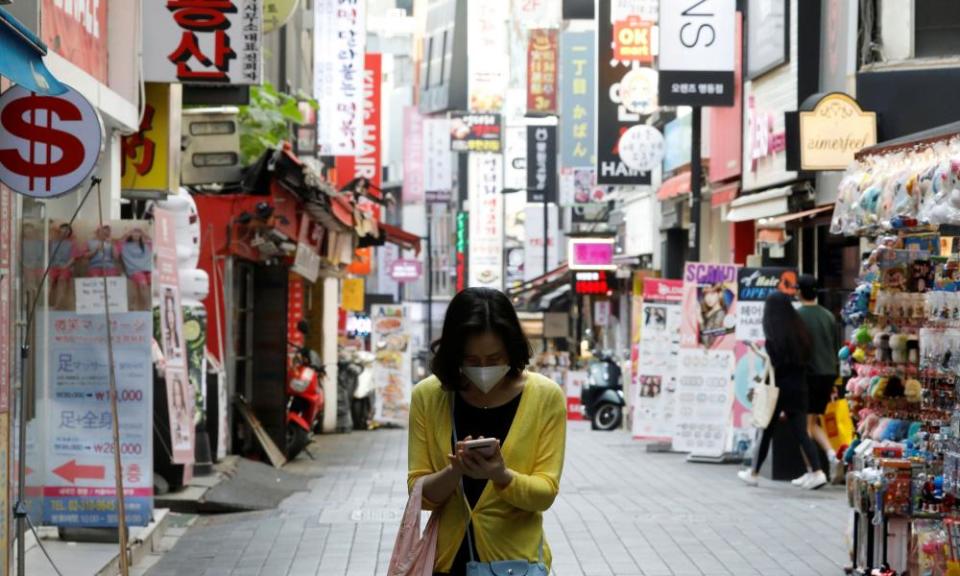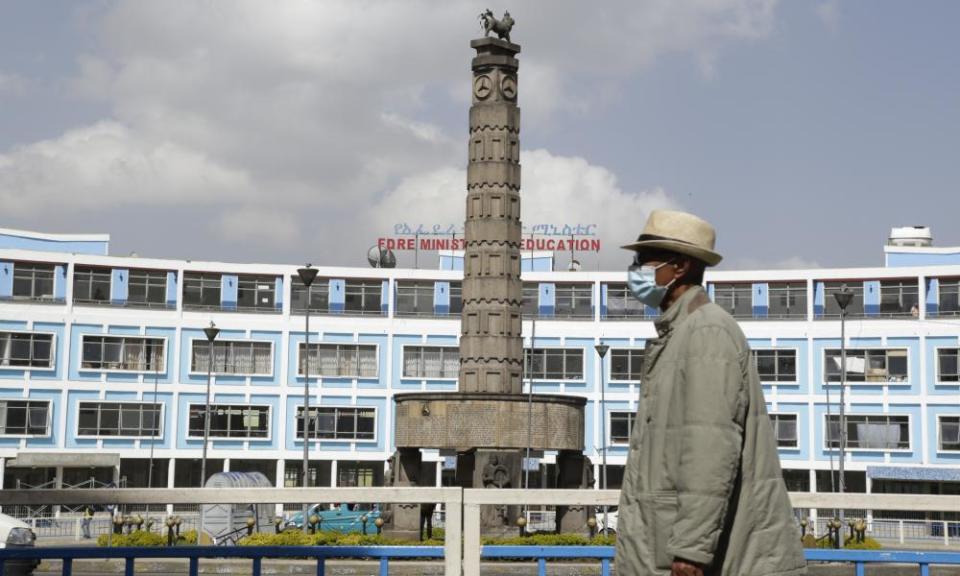Global report: France to ease Covid-19 travel restrictions and open restaurants

The French government announced a further loosening of coronavirus restrictions on Thursday, as officials in South Korea reimposed strict lockdown measures in the Seoul area after the country’s biggest rise in infections in almost two months.
The announcements came as Donald Trump described the US’s 100,000 coronavirus deaths as a “very sad milestone”, and the World Health Organization said a significant proportion of the 159,000 excess deaths recorded cross Europe since early March were linked to Covid-19.
In France, the prime minister, Édouard Philippe, said a ban on journeys of more than 100km (62 miles) would end on 2 June, adding that cafes, bars and restaurants in so-called green areas – where the virus is not circulating widely – would be able to reopen on the same date.
No more than 10 people will be allowed to sit together, tables must be spaced 1 metre from each other, and kitchen and restaurant staff must wear masks.
Philippe said establishments in orange areas – such as Paris – would only be able to reopen outside terraces.
Secondary schools and lycées in green areas will be able to resume all classes from 2 June, but must follow health measures, such a maximum of 15 pupils per class. In orange areas most classes will not begin again until September.
The prime minister also said the country’s external borders would remain closed until 15 June, when it is hoped they will be reopen to EU nationals in coordination with other EU27 states.
Philippe said tFrance was “in a better place than where we expected to be”, but urged people to continue respecting the rules and remain careful and vigilant.

In South Korea, 79 new infections – 67 of them from the Seoul area – prompted the authorities to reimplement lockdown measures across the metropolitan area of the capital, which is home to half the country’s 52 million population.
The health minister, Park Neung-hoo, said museums, parks and art galleries would all be closed again for a fortnight from Friday while companies have been urged to reintroduce flexible working for employees.
In the US, Trump, whose stewardship of the health crisis has drawn bitter criticism, reacted to the country passing 100,000 deaths in characteristic fashion.
“We have just reached a very sad milestone with the coronavirus pandemic deaths reaching 100,000,” he tweeted. “To all of the families & friends of those who have passed, I want to extend my heartfelt sympathy & love for everything that these great people stood for & represent. God be with you!”
With fears of a second wave of infections mounting, the WHO warned that the global Covid-19 death toll could be far higher than preliminary figures suggest.
It said there had been almost 160,000 excess deaths – or unexpected fatalities – across 24 European countries in the past two-and-a-half months.
Although the figure for excess deaths takes into account all mortality causes, its timing - recorded as thousands of people were dying in intensive care units in places such as northern Italy, France, Spain and Britain - points to the virus’s deadly impact.
“What we have seen very clearly is that the peak in excess mortality corresponds in those countries to the peak of the transmission of Covid-19,” said Katie Smallwood, a WHO emergency official.
“This gives us a very good indication that a very significant proportion of this excess deaths is linked and due to Covid-19.”
Smallwood said countries looking to ease restrictions needed to have have robust disease detection, testing and tracing systems in place to help contain a potential second wave of the pandemic.

In Africa, health experts said that community transmissions – where patients have no travel history or known contact with infected people – were on the rise, especially in Ethiopia.
“That means we need to increase our public health measures like distancing, wearing of masks, washing of hands,” said John Nkengasong, the head of the Africa Centres for Disease Control and Prevention.
Nkengasong advised countries to change the way they tested their populations, recommending they conduct surveillance testing of those with flu-like symptoms rather than focusing on testing people arriving at airports.
To date, African countries have recorded 123,724 cases of the virus, and 3,668 deaths.
Meanwhile, in Germany, unions have accused the online retail giant Amazon of exposing its workers to the virus as it enjoys record profits during the pandemic.
Last Tuesday, a parliamentary query from the Green party revealed that at least 53 of the 1,800 employees at an Amazon centre in Winsen, Lower Saxony, were infected with the virus between 16 March and 29 April.
A spokesperson for the city of Pforzheim in Baden-Württemberg said there had also been at least seven infections that could be traced to an Amazon warehouse in the city.
The German services union ver.di accuses Amazon of having been slow to adapt working conditions to social distancing guidelines.
The company told German media that it had adjusted its hygiene protocols and there had been no further confirmed infections at the Winsen centre in May.
“Nothing is more important to us than the health and wellbeing of our workers, said a spokesperson.
In other global coronavirus developments:
The Philippines reported 17 more coronavirus deaths and 539 new infections, the biggest number of cases reported in a single day since the virus was first detected in the country. The health ministry said infections had risen to 15,588 and 921 people had died.
Deaths from the coronavirus in Italy rose by 70 on Thursday, down from 117 on Wednesday, bringing the total to 33,142. There are 47,986 people who are currently have the virus in Italy, down by 2,980 within the last 24 hours. Italy has 231,732 confirmed cases to date, including the deaths and 150, 604 survivors.
Official figures from Denmark suggested that sending children back to school and daycare centres has not led to an increase in Covid-19 infections. Following a one-month lockdown, Denmark allowed children between two to 12 years of age back in day cares and schools on 15 April. Health authorities said five weeks’ worth of data had shown there had been no “negative effects from the reopening of schools”.
Additional reporting by Justin McCurry in Tokyo, Luke Harding in London, Philip Oltermann in Berlin, Angela Giuffrida in Rome and agencies


